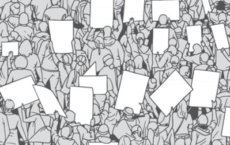
The Cambridge Constitutional History of the United Kingdom was launched in the House of Lords. The President of the Supreme Court, Lord Reed, hosted the launch.
Read More“The law is reason, free from passion.” This statement, attributed to the Greek philosopher Aristotle, suggests that judges, lawyers, and scholars must examine the law objectively, without succumbing to the influence of personal emotions or experiences. But might our emotions, experiences, and identities actually influence how we approach the law? And, if so, is there […]
Read MoreWe live in a world of States. With the exception of the high seas, outer space, and Antarctica, the entirety of our currently inhabitable environment falls within the jurisdiction of one State or another. States are some of the most powerful entities on our planet in terms of their social, environmental, and economic influence. For […]
Read MoreWith all the recent interest in the International Criminal Court – can it prosecute Putin? Will it intervene in the Hamas-Israeli War? Will it finally investigate crimes in Venezuela? – it would be easy to forget that this court is not simply a juridical black box for war criminals to be sent to. It is also an […]
Read MoreDespite the increasing number of persons fleeing across borders due to widespread violence in situations of armed conflict, there has long been a misconception that these individuals are not ‘refugees’ as defined by the 1951 United Nations Refugee Convention. The Refugee Convention defines a refugee as a person who “owing to a well-founded fear of […]
Read MoreCentral to our concept of democracy is counting all votes equally. Who would support an election rule in which we add up all the votes and declare the person who came in second the winner? But that is exactly what can—and does—occur under the electoral college. In 1876, 1888, 2000, 2016, and, arguably, 1960, the […]
Read MoreThe journey towards caring for cultural heritageI have been interested for many years in how the UK looks after cultural heritage by law and ethical principles. I came to adopt the framework of care, in some ways by accident. The term ‘caring’ started for me as a way of explaining the wide range of activities […]
Read MoreKathleen Stock identifies as a philosopher of (expert on) sex and gender identity partly on the grounds that she has spent years (let us take her word for it) thinking, researching, and building careful and comprehensive arguments about these issues. She also says, ‘it’s not hate speech to say males can’t be women’. But this […]
Read MoreThe Cambridge Constitutional History of the United Kingdom was launched in the House of Lords. The President of the Supreme Court, Lord Reed, hosted the launch.
Read More“The law is reason, free from passion.” This statement, attributed to the Greek philosopher Aristotle, suggests that judges, lawyers, and scholars must examine the law objectively, without succumbing to the influence of personal emotions or experiences. But might our emotions, experiences, and identities actually influence how we approach the law? And, if so, is there […]
Read MoreWe live in a world of States. With the exception of the high seas, outer space, and Antarctica, the entirety of our currently inhabitable environment falls within the jurisdiction of one State or another. States are some of the most powerful entities on our planet in terms of their social, environmental, and economic influence. For […]
Read MoreWith all the recent interest in the International Criminal Court – can it prosecute Putin? Will it intervene in the Hamas-Israeli War? Will it finally investigate crimes in Venezuela? – it would be easy to forget that this court is not simply a juridical black box for war criminals to be sent to. It is also an […]
Read MoreDespite the increasing number of persons fleeing across borders due to widespread violence in situations of armed conflict, there has long been a misconception that these individuals are not ‘refugees’ as defined by the 1951 United Nations Refugee Convention. The Refugee Convention defines a refugee as a person who “owing to a well-founded fear of […]
Read MoreCentral to our concept of democracy is counting all votes equally. Who would support an election rule in which we add up all the votes and declare the person who came in second the winner? But that is exactly what can—and does—occur under the electoral college. In 1876, 1888, 2000, 2016, and, arguably, 1960, the […]
Read MoreThe journey towards caring for cultural heritageI have been interested for many years in how the UK looks after cultural heritage by law and ethical principles. I came to adopt the framework of care, in some ways by accident. The term ‘caring’ started for me as a way of explaining the wide range of activities […]
Read MoreKathleen Stock identifies as a philosopher of (expert on) sex and gender identity partly on the grounds that she has spent years (let us take her word for it) thinking, researching, and building careful and comprehensive arguments about these issues. She also says, ‘it’s not hate speech to say males can’t be women’. But this […]
Read MoreKeep up with the latest from Cambridge University Press on our social media accounts.
Opposing the Rule of Law
Contesting Immigration Policy in Court
Challenging Boardroom Homogeneity
Confronting the Internet\\\'s Dark Side
The Politics of Parliamentary Debate
The Politics of Parliamentary Debate
Abortion Politics, Mass Media, and Social Movements in America
Forging Rivals
The Implementation of the Findings of the African Commission on Human and Peoples\' Rights
The Implementation of the Findings of the African Commission on Human and Peoples\' Rights
Climate Change: A Wicked Problem
Strategically Created Treaty Conflicts and the Politics of International Law
Language and the Law
University of Colorado Boulder
Mission and Money
International White Collar Crime
Mission and Money
Competitive Authoritarianism
Moral Dilemmas of Modern War
Human Rights in the Constitutional Law of the United States
Radicals in Their Own Time
Abortion Politics in Congress
Abortion Politics in Congress
Capitalism, For and Against
Capitalism, For and Against
Srebrenica in the Aftermath of Genocide
The Paradox of Professionalism
Obama\\\'s Bank
The Immigration Battle in American Courts
I Do Solemnly Swear
After Bush
After Bush
Constitutional Illusions and Anchoring Truths
Mission and Money
Law\'s Allure
The Legitimacy Puzzle in Latin America
The Legitimacy Puzzle in Latin America
Srebrenica in the Aftermath of Genocide
The Political Economy of the American Frontier
The Natural Moral Law
Library marketing associate
Loving v. Virginia in a Post-Racial World
Against Intellectual Monopoly
A Nation of Immigrants
Peacebuilding in the African Union
Justice for Earthlings
The End of Straight Supremacy
Justice Denied
The 9/11 Effect: Comparative Counter-Terrorism
Confronting Cyber-Bullying
Presidents and Civil Liberties from Wilson to Obama
The Treason Trial of Aaron Burr
The International Diplomacy of Israel’s Founders
Stephen A. Douglas and Antebellum Democracy
Speech Out of Doors
Managing Cyber Attacks in International Law, Business, and Relations
Internet Privacy Rights
Developing Countries in the GATT Legal System
The Fascists and the Jews of Italy
A Transatlantic Community of Law
Presidential Legislation in India
Law and Identity in Colonial South Asia
Constitutions in Authoritarian Regimes
The International Distribution of News
Domestic Politics and International Human Rights Tribunals
State Strategies in International Bargaining
Sir Edward Coke and the Reformation of the Laws
Regulating Business for Peace
The Founders and the Idea of a National University
The Politics of Gay Marriage in Latin America
Public Service in EU Law
Laura F. Edwards, Duke University, North Carolina Laura F. Edwards is the Peabody Family Professor of History at Duke University. Her book The People and Their Peace: Legal Culture and the Transformation of Inequality in the Post-Revolutionary South was awarded the American Historical Association\\\\\\\'s 2009 Littleton–Griswold Prize for the best book in law and society and the Southern Historical Association\\\\\\\'s Charles Sydnor Prize for the best book in Southern history.
Popular Governance of Post-Conflict Reconstruction
Constitution Making during State Building
European Consumer Access to Justice Revisited
The International Law of Disaster Relief
Human Rights in International Relations
Cybercrime: The Psychology of Online Offenders
Cybercrime: The Psychology of Online Offenders
Anarchy and Legal Order
Declaring War
Marketing intern
Tallinn Manual on the International Law Applicable to Cyber Warfare
On Dissent
On Dissent
Dressing Constitutionally
The Sierra Leone Special Court and Its Legacy
The Delimitation of the Continental Shelf between Denmark, Germany and the Netherlands
NATO Cooperative Cyber Defence Centre of Excellence
Publicist
To receive updates on Law & Government news from Cambridge University Press and Fifteen Eighty Four, please join our email list below. We will not disclose your email address to any third party









